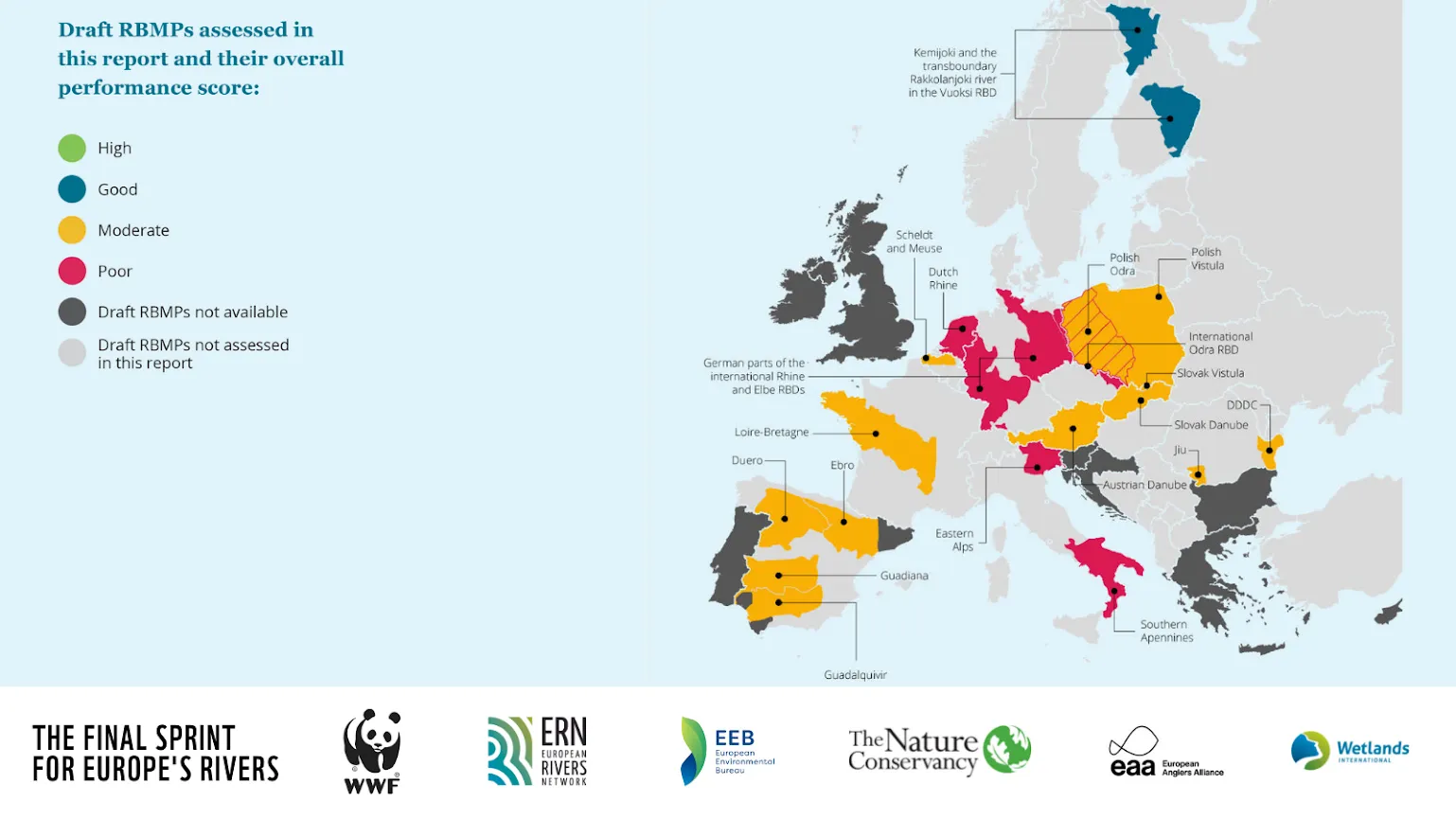Europe’s rivers nowhere near healthy by 2027 deadline – report
90% of river basins studied in various EU countries will still be unhealthy by 2027, new research reveals. This means those countries will miss the legally binding EU target to return Europe’s dirty freshwaters to health by then.
Member States have only a few weeks left to finalise their river basin management plans for the next six years, as EU law requires. The drafts for 2022-2027 are the third round of national plans before the 2027 target and are Europe’s final opportunity to get things right.
The second edition of this report, published by WWF and the Living Rivers Europe Coalition [1], finds that only two out of the 21 river basins analysed – both in Finland – might see good health by 2027. However, even the plans for those two basins contain gaps, in particular concerning the level of funding. For this edition, WWF assessed eight new draft plans from Poland, Romania and Spain, none of which are classed as “good”.
Draft River Basin Management Plan assessed in this report and their performance scores:

Claire Baffert, Senior Water Policy Officer, WWF European Policy Office, said: “Instead of focusing their efforts on the final sprint towards healthy rivers in 2027, too many EU countries are dragging their feet. Our rivers deserve good planning; serious measures; credible investments. Unless this is reflected in their final plans, many EU countries are racing straight towards a breach of EU law.”
Six draft plans rank poorly, including the two assessed Italian plans, two assessed German plans, the Dutch Rhine plan, and the International Odra plan. Most of the river basins suffer from a lack of national budget allocated to water management, insufficient integration of water protection into other policies – in particular energy, agriculture and infrastructure – and the multiple misuses of derogations – all issues that were already flagged in the 2019 Fitness Check conclusions of the Water Framework Directive’s (WFD) evaluation and have been repeatedly highlighted since then.
The performance of the draft RBMPs is ‘poor’ for nearly half of the analysed indicators, including pollution, excessive water extraction, blockages like dams, poor flood and drought management, agriculture, hydropower, coal mining and missing nature-restoring measures. EU countries – which have until the end of this year to publish their final RBMPs according to the Water Framework Directive– must address the shortcomings identified in the draft plans to change the future for our freshwaters and meet the 2027 goal.
Mark Owen, Freshwater Policy Advisor, European Anglers Alliance said: “Hundreds of thousands of EU citizens came together during the Protect Water campaign to ensure that Member States meet their obligations under the Water Framework Directive. This massive mobilisation was a clear signal for the Commission to hold European governments accountable for delivering on their commitments. Citizens depend on freshwater for their health and well-being, they mustn’t be ignored.”
WWF and partners are also very concerned that in September 2021, at least nine Member States (Bulgaria, Croatia, Cyprus, Greece, Ireland, Portugal, Slovenia, some river basins in Spain, and the UK [2]) had not yet presented their draft plans for all river basins.
Ewa Leś, CCB Working Group Leader on River Basin and Wastewater Management, and Artur Furdyna, from Friends of Ina and Gowienica rivers Association (CCB Member Organization), contributed to the report.
The report, ‘The final sprint for Europe’s rivers: An NGO analysis of 2022-2027 draft River Basin Management Plans’ is available here, along with a summary.
NOTES
[1] Living Rivers Europe is a coalition of five environmental and angling organisations gathering WWF’s European network, the European Anglers Alliance, European Environmental Bureau, European Rivers Network, The Nature Conservancy and Wetlands International.
[2] As the Directive was signed by the UK government prior to the UK’s split with Europe, it has been transposed in to UK law and therefore continues to apply.
Contacts:
Ines Abbas
Communications Officer
iabbas@wwf.eu
+32 488 99 27 65 1

